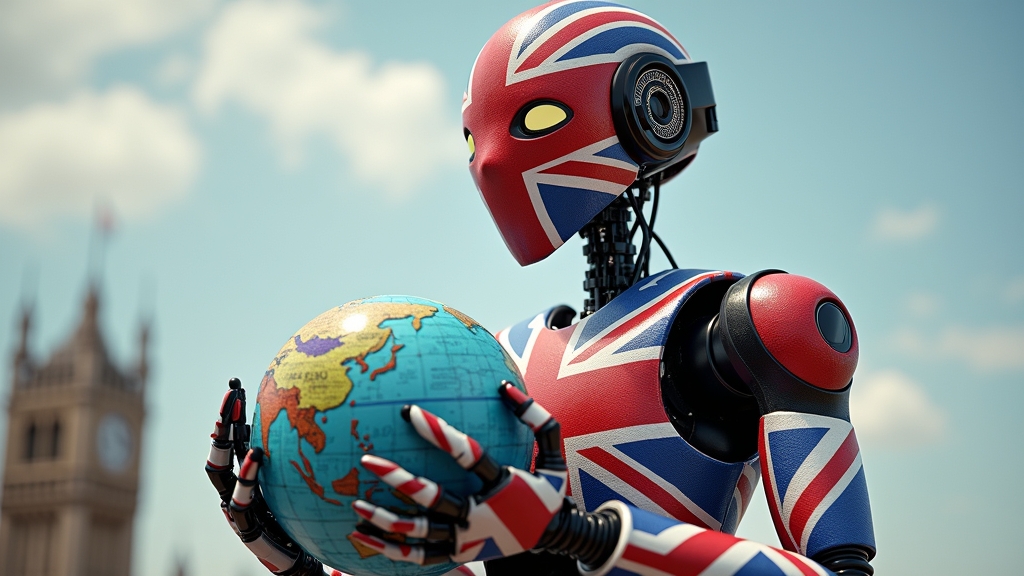Britain Vows to Lead AI Revolution, Because If Anyone Should Control Killer Robots, It’s Definitely Us
In a move that screams “trust us, we’ve got this,” Britain has announced its grand ambition to become the globe’s chief AI mastermind—because if there’s one thing the country that brought you a collapsing railway network and three prime ministers in a year excels at, it’s long-term planning.
Eleven years after Professor Stephen Hawking, the Einstein of our time, casually warned that unregulated AI might *maybe, possibly* obliterate humanity, the UK has decided that playing with digital fire is not a bug but a feature. “We mustn’t fear AI’s potential. Instead, we should harness it—preferably before someone else figures out how to,” explained an unidentified government spokesperson while nervously Googling “how to reboot Skynet.”
This sudden burst of innovation FOMO isn’t without a hint of irony. Britain, a longtime importer of American technology—like social media platforms to ruin family reunions and Netflix algorithms designed to confuse you with Polish cooking shows—now wants to flip the script. “We refuse to be mere takers of ideas!” declared someone’s uncle at the Ministry of Ideas, conveniently overlooking that “taking” ideas is arguably the most British thing ever (#colonialism, anyone?).
The inspiration for this bold tech pivot? None other than Donald Trump himself. Yes, you read that right. With the “Great Firewall of Trump” having torched every tech ethic and safety regulation faster than you can say “Fake News AI Deepfake Generator,” the UK government looked across the Atlantic and thought, *Wow, we should absolutely get in on this but, like, with queuing and tea breaks.*
Of course, the real genius lies in hosting summits to solve everything. Britain is no stranger to summits that feel urgent but accomplish little—the AI summit at Bletchley Park being a classic example. It concluded on, well, vague vibes of optimism. Next up, France and India will host their own AI summit, presumably so everyone can pretend to cooperate just long enough to lull the machines into a false sense of superiority.
“Global safety standards are crucial,” said Dr. Miranda Algorithm, a fictional industry expert whose only credential is we made her up, echoing real-world conversations that involve scary words like “loss of control.” But really, who needs control when you can have an online bot apologize in Shakespearean prose for double-charging you a £3.99 avocado?
Yet unlike other countries, which might pause to think through AI’s consequences, Britain believes in failing forward. “We’re aiming for AI dominance because Britain has always been at the forefront of technological innovation,” said Sir Ignatius Overpromise, head of the National Tech Optimism Board, conveniently glossing over our recent track record of Brexit apps and, let’s face it, still not having reliable 4G in half the country.
Critics, however, remain concerned. “Are we really ready to lead the AI revolution?” asked one skeptical commentator while pointing to WiFi dead spots in central London. Another feared “an era where rogue British AI systems might do something horrifying like…make everyone sound like Hugh Grant.”
Meanwhile, Britain’s AI cheerleaders argue this is all about retaining “global influence.” What better way to achieve that than by ensuring that some hyper-intelligent chatbot with better handwriting than you has London listed as its birthplace? “The future is bright, the future is British!” declared a government press release—possibly auto-generated.
Until then, the UK’s roadmap involves a strategic mix of innovation, regulation, and occasionally pleading with Elon Musk to not create an AI god. As Professor Codswallop (another product of our imagination) put it: “The key is to make everyone believe that experimenting with AI on this tiny, weather-challenged island is the best way to not just survive, but thrive. Genius, isn’t it?”
So rest easy, world. If the apocalypse does come, it’s comforting to know it’ll at least be powered by technology developed under the watchful, benevolent eye of Britain. Let’s just hope it doesn’t demand a six-month delay while waiting for the next available parliamentary debate.





